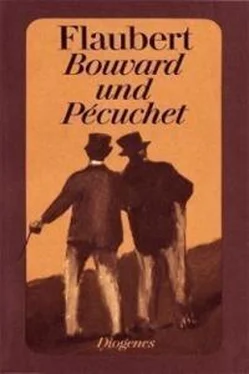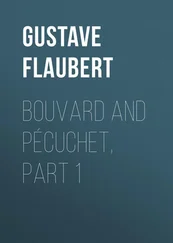Through the garden gate they saw M. Girbal, superintendent of taxes, making his way in, together with Captain Heurtaux, a landowner; and Beljambe, the innkeeper, appeared, assisting with his arm Langlois, the grocer, who walked with difficulty on account of his catarrh.
Pécuchet, without bestowing a thought on them, took up the argument:
"Excuse me, M. Jeufroy. The weight of the atmosphere, science demonstrates to us, is equal to that of a mass of water which would make a covering of ten metres [8] This would, roughly speaking, be about eleven yards.—TRANSLATOR.
around the globe. Consequently, if all the air that had been condensed fell down in a liquid state, it would augment very little the mass of existing waters."
The vestrymen opened their eyes wide, and listened.
The curé lost patience. "Will you deny that shells have been found on the mountains? What put them there, if not the Deluge? They are not accustomed, I believe, to grow out of the ground of themselves alone, like carrots!" And this joke having made the assembly laugh, he added, pressing his lips together: "Unless this be another discovery of science!"
Bouvard was pleased to reply by referring to the rising of mountains, the theory of Elie de Beaumont.
"Don't know him," returned the abbé.
Foureau hastened to explain: "He is from Caen. I have seen him at the Prefecture."
"But if your Deluge," Bouvard broke in again, "had sent shells drifting, they would be found broken on the surface, and not at depths of three hundred metres sometimes."
The priest fell back on the truth of the Scriptures, the tradition of the human race, and the animals discovered in the ice in Siberia.
"That does not prove that man existed at the time they did."
The earth, in Pécuchet's view, was much older. "The delta of the Mississippi goes back to tens of thousands of years. The actual epoch is a hundred thousand, at least. The lists of Manetho―"
The Count de Faverges appeared on the scene. They were all silent at his approach.
"Go on, pray. What were you talking about?"
"These gentlemen are wrangling with me," replied the abbé.
"About what?"
"About Holy Writ, M. le Comte."
Bouvard immediately pleaded that they had a right, as geologists, to discuss religion.
"Take care," said the count; "you know the phrase, my dear sir, 'A little science takes us away from it, a great deal leads us back to it'?" And in a tone at the same time haughty and paternal: "Believe me, you will come back to it! you will come back to it!"
"Perhaps so. But what were we to think of a book in which it is pretended that the light was created before the sun? as if the sun were not the sole cause of light!"
"You forget the light which we call boreal," said the ecclesiastic.
Bouvard, without answering this point, strongly denied that light could be on one side and darkness on the other, that evening and morning could have existed when there were no stars, or that the animals made their appearance suddenly, instead of being formed by crystallisation.
As the walks were too narrow, while gesticulating, they trod on the flower–borders. Langlois took a fit of coughing.
The captain exclaimed: "You are revolutionaries!"
Girbal: "Peace! peace!"
The priest: "What materialism!"
Foureau: "Let us rather occupy ourselves with our chasuble!"
"No! let me speak!" And Bouvard, growing more heated, went on to say that man was descended from the ape!
All the vestrymen looked at each other, much amazed, and as if to assure themselves that they were not apes.
Bouvard went on: "By comparing the foetus of a woman, of a bitch, of a bird, of a frog―"
"Enough!"
"For my part, I go farther!" cried Pécuchet. "Man is descended from the fishes!"
There was a burst of laughter. But without being disturbed:
"The Telliamed —an Arab book―"
"Come, gentlemen, let us hold our meeting."
And they entered the sacristy.
The two comrades had not given the Abbé Jeufroy such a fall as they expected; therefore, Pécuchet found in him "the stamp of Jesuitism." His "boreal light," however, caused them uneasiness. They searched for it in Orbigny's manual.
"This is a hypothesis to explain why the vegetable fossils of Baffin's Bay resemble the Equatorial plants. We suppose, in place of the sun, a great luminous source of heat which has now disappeared, and of which the Aurora Borealis is but perhaps a vestige."
Then a doubt came to them as to what proceeds from man, and, in their perplexity, they thought of Vaucorbeil.
He had not followed up his threats. As of yore, he passed every morning before their grating, striking all the bars with his walking–stick one after the other.
Bouvard watched him, and, having stopped him, said he wanted to submit to him a curious point in anthropology.
"Do you believe that the human race is descended from fishes?"
"What nonsense!"
"From apes rather—isn't that so?"
"Directly, that is impossible!"
On whom could they depend? For, in fact, the doctor was not a Catholic!
They continued their studies, but without enthusiasm, being weary of eocene and miocene, of Mount Jurillo, of the Julia Island, of the mammoths of Siberia and of the fossils, invariably compared in all the authors to "medals which are authentic testimonies," so much so that one day Bouvard threw his knapsack on the ground, declaring that he would not go any farther.
"Geology is too defective. Some parts of Europe are hardly known. As for the rest, together with the foundation of the oceans, we shall always be in a state of ignorance on the subject."
Finally, Pécuchet having pronounced the word "mineral kingdom":
"I don't believe in it, this mineral kingdom, since organic substances have taken part in the formation of flint, of chalk, and perhaps of gold. Hasn't the diamond been charcoal; coal a collection of vegetables? and by heating it to I know not how many degrees, we get the sawdust of wood, so that everything passes, everything goes to ruin, and everything is transformed. Creation is carried out in an undulating and fugitive fashion. Much better to occupy ourselves with something else."
He stretched himself on his back and went to sleep, while Pécuchet, with his head down and one knee between his hands, gave himself up to his own reflections.
A border of moss stood on the edge of a hollow path overhung by ash trees, whose slender tops quivered; angelica, mint, and lavender exhaled warm, pungent odours. The atmosphere was drowsy, and Pécuchet, in a kind of stupor, dreamed of the innumerable existences scattered around him—of the insects that buzzed, the springs hidden beneath the grass, the sap of plants, the birds in their nests, the wind, the clouds—of all Nature, without seeking to unveil her mysteries, enchanted by her power, lost in her grandeur.
"I'm thirsty!" said Bouvard, waking up.
"So am I. I should be glad to drink something."
"That's easy," answered a man who was passing by in his shirt–sleeves with a plank on his shoulder. And they recognised that vagabond to whom, on a former occasion, Bouvard had given a glass of wine. He seemed ten years younger, wore his hair foppishly curled, his moustache well waxed, and twisted his figure about in quite a Parisian fashion. After walking about a hundred paces, he opened the gateway of a farmyard, threw down his plank against the wall, and led them into a large kitchen.
"Mélie! are you there, Mélie?"
A young girl appeared. At a word from him she drew some liquor and came back to the table to serve the gentlemen.
Her wheat–coloured head–bands fell over a cap of grey linen. Her worn dress of poor material fell down her entire body without a crease, and, with her straight nose and blue eyes, she had about her something dainty, rustic, and ingenuous.
Читать дальше








![Гюстав Флобер - Закат Карфагена [Сборник]](/books/414440/gyustav-flober-zakat-karfagena-sbornik-thumb.webp)


